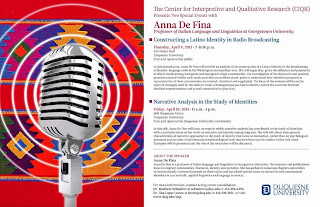The Center for Interpretive and Qualitative Research
(CIQR -- "seeker": http://www.duq.edu/ciqr/)
Click here for videos of previous events
Presenter: Dr. Anna De Fina, Professor of Italian Language and Linguistics, Italian Department, Georgetown University
Public Talk: Constructing a Latino Identity in Radio Broadcasting
Date: Thursday, April 9th, 2015
Time: 7:00pm - 8:30pm
Location: 324 Fisher, Duquesne University
Symposium Talk: Narrative Analysis in the Study of Identities
Date: Friday, April 10th, 2015
Time: 11:00am - 1:00pm
Location: 608 Student Union, Duquesne University
Presentation Abstracts:
Public Talk: Constructing a Latino Identity in Radio Broadcasting
In this talk I will present an analysis of the construction of a Latino identity in the broadcasting of a Spanish language radio in the Washington metropolitan area. I will argue that, given the influence and popularity of ethnic media among immigrant and immigrant origin communities, the investigation of the discursive and semiotic practices enacted within such media provides an excellent stand-point to understand how identities proposed as representative of these communities are created, circulated and negotiated. I will frame the research within a growing interest in Sociolinguistics in phenomena related to mobility, globalization and transnational flows, explaining how such orientations have changed the way sociolinguists look at linguistic practices. The focus of the analysis will be on the types of strategies used by the radio to create a homogeneous pan Latino identity and on the contrasts between idealized representations and actual communicative practices.
Symposium Talk: Narrative Analysis in the Study of Identities
Note: Please read the attached essay 'Group Identity, Narrative, and Self-Representations' (document name: De Fina.pdf) before attending the symposium, if possible.
This talk will focus on ways in which narrative analysis has contributed to the study of identities, with a particular focus on my work on narrative and identity among migrants. I will talk about some general characteristics of narrative approaches to the study of identity that focus on interaction rather than on psychological processes and on some of the theoretical methodological tools that have been used in studies within this trend. I will present examples of ways in which narrative analysis can help researchers understand identity construction and representation: for instance through the study of categorization processes and their negotiation in interviews. I will also discuss the role of the researcher not only within the research process but also in the analysis of data.
Bio:
Anna De Fina is Professor of Italian Language and Linguistics in the Italian Department at Georgetown University. Her interests and publications focus on migrant communities, discourse, identity and narrative. She has authored numerous chapters and articles in internationally renowned journals on these topics and she has edited special issues on Narratives and Transnational Identities in Text and Talk, Applied Linguistics, and Language in Society. Her books include Analyzing Narratives (2012, co-authored with Alexandra Georgakopoulou), Identity in Narrative: A Study of Immigrant Discourse (2003) and the co-edited volumes Dislocations, Relocations, Narratives of Migration (2005, with M. Baynham), Discourse and Identity (2006, D. Schiffrin and M. Bamberg.Her latest publication is the Handbook of Narrative Analysis (Wiley), edited with Alexandra Georgakopoulou and forthcoming in Spring 2015.
All interested faculty, graduate students, and other parties are invited. Refreshments will be served.
For inquiries concerning CIQR, please contact the acting Center Coordinators, Dr. Matthew Schneirov, Dept. of Sociology, at schneirov@duq.edu, 412.396.6494, Dr. Lisa Lopez Levers, Dept. of Counseling, Psychology, and Special Education at levers@duq.edu, 412.396.1871, or visit the CIQR http://www.duq.edu/ciqr
*The Center has been officially approved by the Dean of the College and Graduate School of Liberal Arts, The Graduate Council of the College, and the Council of Deans for the University. It is based in the College but open to members of all the schools of the University. It includes interpretive and qualitative research in both the humanities and the social and behavioral sciences (including the practice of the latter in Nursing, Education, Occupational Therapy and other professional schools).

No hay comentarios.:
Publicar un comentario